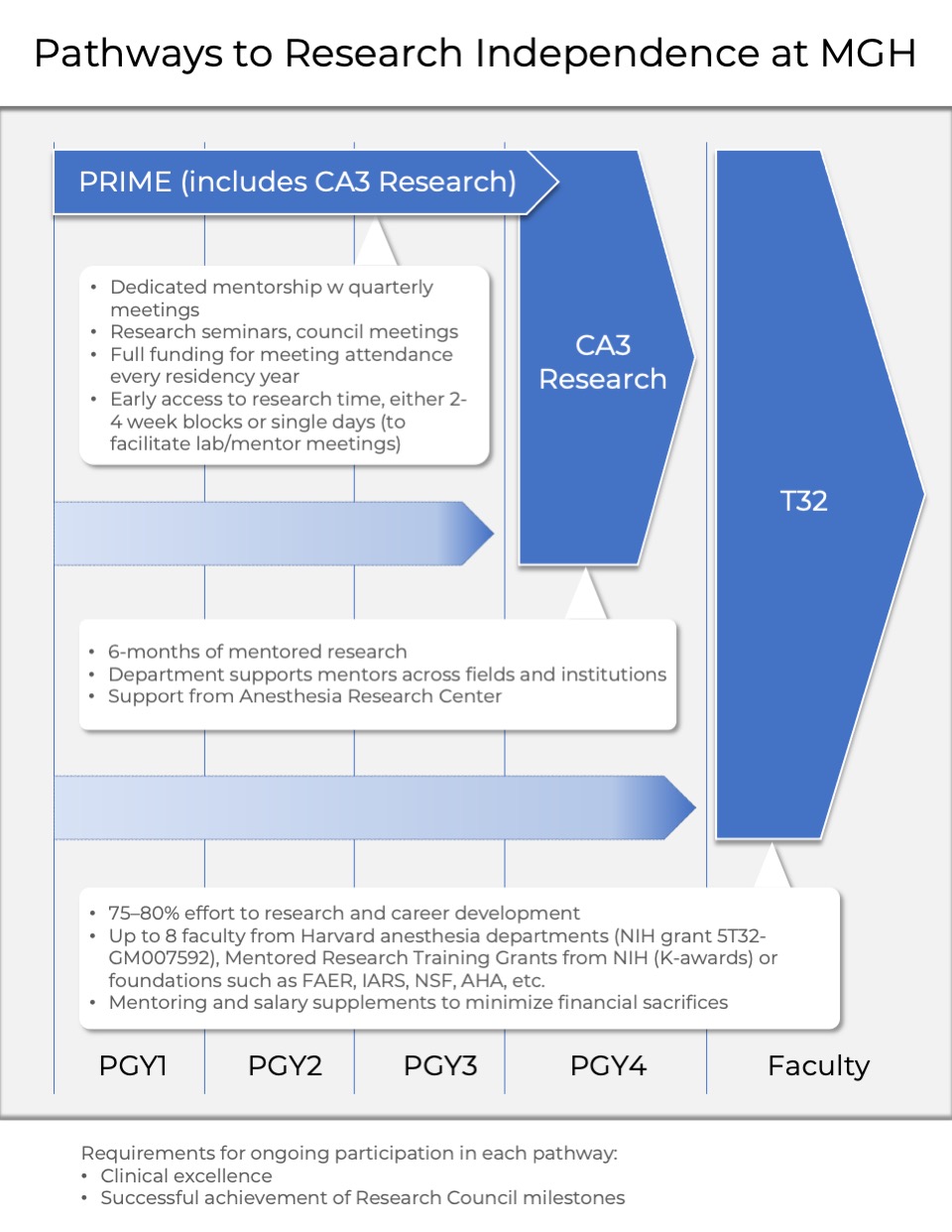PRime Track
Pathway to Research Independence with Mentorship and Education
Track Description
Our PRIME (Pathway to Research Independence with Mentorship and Education) track is overseen by our Department Chair Dr. Johnson-Akeju, our Program Director, Dr. Saddawi-Konefka, the director of our Mentored Scientist Research track, Dr. Stuart Forman, and our PRIME Track Director, Dr. Shiqian Shen. It was started in 2018 to provide an earlier entry point to our CA3 research block.
This is a categorical 4-year match (PGY1-4) and provides an earlier entry point to our research scene. Residents on this track have the option of additional research time prior to the 6-month CA3 research block.
Our PRIME track residents benefit from the following additional resources:
- Personalized counseling and matchmaking with potential research mentors (whether in MGH DACCPM or not) with quarterly program leadership meetings
- Opportunities to meet with potential mentors and either shadow lab members or do short do short lab “rotations” (either single days or in the form of 2-4 week blocks); total research time in 4-year program is 6-9 months.
- Yearly full-cost travel funding for scientific meeting attendance
- Research Council meeting attendance
- 6-month CA3 research block and priority consideration for one of our faculty T32 positions through our Mentored Scientist Research Track
This is in addition to everything all our residents have access to:
- Anesthesia Research Center (ARC) to support investigators throughout the research process in an effort to optimize study design and execution, regulatory oversight, and statistical methods
- Levy Resident Research Grants to support the career development of outstanding DACCPM residents who wish to improve patient care through research
- Travel Support Program (in addition to PRIME travel support above) provides financial assistance to cover costs of meeting travel, lodging and registration for participating residents.
In this video, Dr. Stu Forman provides a holistic review of research training in the MGH DACCPM.
Meet our Resident Research Track Alumni
Click on the faces for more information about each of these researchers.
Faculty at MGH DACCPM. Research focuses on local anesthetic systemic toxicity – mechanisms and treatment. Funding includes Harvard Anesthesiology T32 Training Grant
Van Poznak Scholar at Weill Cornell Medicine, Runway Postdoc at Cornell Tech. Director of Digital Human Rights Core. Research focuses on devices and technology innovations. Funding includes NIH/NIA GEMSSTAR R03, Cornell University Migrations Initiative, Industry (Apple and Proterris)
Instructor at MGH DACCPM. Research focuses on development of genetic therapeutics for inflammatory hair loss disorders, Staphylococus aureus pathogenesis, role of patient microbiome in surgical site infection, resistance to surgical antibiotic prophylaxis. Funding includes Harvard Anesthesiology T32 Training Grant
Instructor at BWH. Research focuses on preeclampsia, uterine contraction, optical measurements.
Instructor at MGH DACCPM. Research focuses on machine learning in delirium.
Assistant Professor at Boston University, School of Medicine. Department Director of Quality and Safety.
Instructor at MGH DACCPM. Research focuses on computational biology and GABA receptors.
Instructor at MGH DACCPM. Director of Anesthesia for Plastic, Reconstructive and Breast Oncology Surgery. Research focuses on critical care, endothelium lymphatics, lymphatic diseases, ion channel basis of lymphatic vessel contractility, and lymphedema. Funding includes Eleanor and Miles Shore Award.
Assistant Professor at MGH DACCPM. Research focuses on disorders of cognition, sleep and circadian rhythm, and neurotrauma. Funding includes Harvard Anesthesiology T32 Training Grant, FAER-MRTG (past), NIH/NIA R03, BrightFocus.
Assistant Professor at MGH DACCPM. Medical Director of Healthcare Systems Engineering. Research focuses on remote monitoring and digital health.
Private practice in North Carolina
Clinical Instructor and T32 Research Fellow at the University of Washington. Research focuses on targeting the patient microbiome for the prevention of surgical site infection. Funding includes a hopeful K23 (decisions in process).
Chair of the Anesthesia Department at Tokyo Women’s Hospital
Assistant Professor at MGH DACCPM
Assistant Professor at MGH DACCPM. Research focuses on medication safety and digital health innovation. Funding includes Harvard Anesthesiology T32 Training Grant, NIH/AHRQ K08 Award, Doris Duke Foundation, Doctors Company Foundation, MGH ECOR Claflin Award.
Associate Professor and Michael K. Cahalan Presidential Chair at University of Utah. Research focuses on analgesic mechanisms. Funding includes Harvard Anesthesiology T32 Training Grant, NIH/NIGMS K08.
Associate Professor at Vanderbilt. Medical Director of Perioperative Informatics. Research focuses on clinical informatics and technology.
Assistant Professor at MGH DACCPM. DIrector of Neuroanesthesia. Research focuses on cardioprotection and inflammation after myocardial infarction, advanced proteomic discovery platforms (mass spec, immunoaffinity assays, aptamer-based) to investigate how protein profiles change in different states of health (exercise, pregnancy) and disease (myocardial reperfusion injury, heart failure). Funding includes Harvard Anesthesiology T32 Training Grant, FAER-MRTG (past), IARS-MRTG (declined), Eleanor and Miles Shore Award (past), NHLBI K08 (current)
Assistant Professor at MGH DACCPM. Research focuses on critical care, cardiovascular physiology, iron homeostasis.
“Our goal is to foster a resource-rich environment that attracts the future leaders in anesthesia…”
Oluwaseun Johnson-Akeju, MD
Anesthetist-in-Chief
